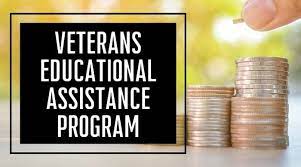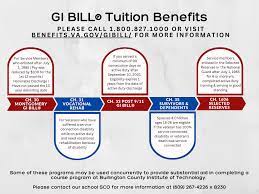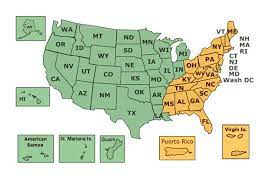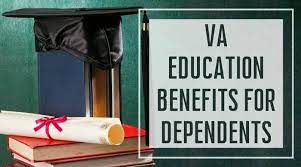Title: Supporting Success: The Veterans Educational Assistance Program
Introduction:
The Veterans Educational Assistance Program (VEAP) is a vital initiative that aims to support the educational pursuits of our nation’s veterans. This program, established by the U.S. Department of Veterans Affairs (VA), provides financial assistance to eligible veterans who wish to pursue higher education or vocational training. VEAP not only empowers veterans with the necessary resources for personal growth and career development but also recognizes their invaluable service to our country.
Financial Support for Education:
VEAP offers a unique opportunity for veterans to receive financial aid to pursue their educational goals. Through this program, participants can contribute a portion of their military pay, which is then matched by the government on a 2-to-1 basis. These contributions are tax-free and can be used towards obtaining a degree, certificate, or other approved educational programs.
Flexible Education Options:
One of the remarkable aspects of VEAP is its flexibility in accommodating various educational paths. Veterans can choose from a wide range of programs including college degrees, technical courses, apprenticeships, and on-the-job training. This flexibility ensures that veterans can select an educational path that aligns with their interests and career aspirations.
Benefits Beyond Financial Assistance:
Beyond financial support, VEAP also offers additional benefits that enhance the overall educational experience for veterans. The VA provides counseling services to help veterans navigate through the application process, select suitable programs, and make informed decisions regarding their educational journey. Furthermore, VEAP participants may also be eligible for other VA benefits such as healthcare coverage and employment assistance.
Transitioning into Civilian Careers:
The Veterans Educational Assistance Program plays a crucial role in assisting veterans with transitioning into civilian careers. By supporting their pursuit of higher education or vocational training, VEAP equips veterans with valuable skills and knowledge needed to excel in various industries. This program helps bridge the gap between military service and civilian life by providing opportunities for personal growth and professional development.
Success Stories:
Numerous success stories have emerged from veterans who have benefitted from the Veterans Educational Assistance Program. Through VEAP, veterans have been able to obtain degrees in diverse fields such as business, healthcare, engineering, and more. These educational achievements have not only opened doors to rewarding careers but have also empowered veterans to contribute their skills and expertise towards the betterment of society.
Conclusion:
The Veterans Educational Assistance Program is a commendable initiative that recognizes the sacrifices made by our nation’s veterans and supports their educational aspirations. By providing financial assistance, counseling services, and flexible education options, VEAP empowers veterans to pursue their dreams and build successful civilian careers. This program is a testament to our commitment as a nation to honor and support those who have selflessly served our country.
Frequently Asked Questions about Veterans Educational Assistance Program
- Who qualifies for Chapter 35 VA benefits?
- Do you have to pay back VA education benefits?
- What are VA educational benefits?
- Can a child of a Veteran get benefits?
Who qualifies for Chapter 35 VA benefits?
Chapter 35 VA benefits, also known as the Survivors’ and Dependents’ Educational Assistance (DEA) program, provide educational assistance to eligible dependents of veterans. To qualify for Chapter 35 VA benefits, individuals must meet certain criteria:
- Dependents of a veteran: The primary requirement is that the individual must be the dependent child or spouse of a service member who has either died or been permanently and totally disabled as a result of their military service. This includes veterans who are missing in action, captured, or forcibly detained by a foreign government or power.
- Age limitations: Generally, dependents can start using Chapter 35 benefits from the age of 18 and continue until they reach the age of 26. However, there are exceptions for certain circumstances such as extended eligibility for disabled dependents.
- Eligibility period: Dependents are typically eligible for Chapter 35 benefits for up to 45 months of full-time education or equivalent part-time education.
- Educational pursuits: Qualifying dependents can pursue various educational programs under Chapter 35 benefits. This includes college degrees, vocational training, apprenticeships, and other approved educational programs.
- Enrollment status: To receive Chapter 35 benefits, dependents must be enrolled in an eligible educational institution on a full-time or part-time basis.
It is important to note that specific eligibility requirements may vary depending on individual circumstances and should be verified with the U.S. Department of Veterans Affairs (VA) to ensure accurate information and guidance regarding Chapter 35 VA benefits.
Do you have to pay back VA education benefits?
No, in general, veterans do not have to pay back VA education benefits. The various education benefit programs provided by the U.S. Department of Veterans Affairs (VA) are designed to support veterans in pursuing their educational goals without the expectation of repayment.
However, it is important to note that there may be certain circumstances where veterans may need to repay a portion or all of their education benefits. For example, if a veteran withdraws from a course after receiving VA benefits, they may be responsible for repaying any tuition or fees that were covered by those benefits.
Additionally, if a veteran receives education benefits but fails to maintain satisfactory academic progress or violates other program requirements, they may be required to repay the VA for any funds received.
It is crucial for veterans to understand the specific terms and conditions of the educational assistance program they are utilizing and to adhere to the guidelines set forth by the VA. By doing so, they can maximize their benefits and avoid any potential repayment obligations.
What are VA educational benefits?
VA educational benefits refer to the various programs and resources offered by the U.S. Department of Veterans Affairs (VA) to assist veterans, active duty military personnel, and their dependents in pursuing education and training opportunities. These benefits are designed to support the transition from military service to civilian life and provide financial assistance for educational pursuits.
Some of the key VA educational benefits include:
- GI Bill® Programs: The GI Bill® is a comprehensive set of programs that provide financial assistance for veterans and eligible dependents to pursue higher education, vocational training, or apprenticeships. This includes the Post-9/11 GI Bill®, Montgomery GI Bill®, and other specialized programs.
- Tuition Assistance: Active duty service members may be eligible for tuition assistance programs offered by their respective branches of the military. These programs provide financial support for college courses taken during off-duty hours.
- Yellow Ribbon Program: Under the Post-9/11 GI Bill®, the Yellow Ribbon Program helps cover tuition costs that exceed the highest public in-state undergraduate rates at participating institutions. This program is particularly beneficial for veterans attending private or out-of-state schools.
- Vocational Rehabilitation and Employment (VR&E) Program: The VR&E program assists veterans with service-connected disabilities in overcoming barriers to employment through education or training. It provides funding for tuition, books, supplies, and other necessary resources.
- Dependents’ Educational Assistance (DEA) Program: The DEA program offers educational benefits to dependents of certain disabled or deceased veterans. Eligible dependents can receive financial support for degree programs, certificate courses, apprenticeships, and more.
- Scholarships and Grants: In addition to federal VA benefits, there are various scholarships and grants available specifically for veterans and their dependents. These external funding sources can further supplement educational expenses.
- College Credit for Military Experience: Many colleges and universities recognize military training and experience by granting academic credit towards degree programs. This recognition can help veterans complete their education more efficiently and save on tuition costs.
It’s important to note that eligibility requirements, benefit amounts, and application processes may vary depending on the specific program. Veterans and their dependents are encouraged to visit the VA website or contact their local VA office for detailed information and guidance on accessing these educational benefits.
Can a child of a Veteran get benefits?
Yes, children of veterans may be eligible for certain benefits and assistance programs. The specific benefits available to them depend on various factors, such as the veteran’s service-connected disability status, military service period, and other eligibility criteria.
Some of the common benefits available to children of veterans include:
- Dependents’ Educational Assistance (DEA): DEA provides educational assistance to eligible dependents of veterans who have a total and permanent service-connected disability, or veterans who died while on active duty or as a result of a service-connected disability. This program offers financial support for college degree programs, vocational training, apprenticeships, and more.
- Health Care: Children of veterans may also be eligible for healthcare benefits through the Civilian Health and Medical Program of the Department of Veterans Affairs (CHAMPVA). CHAMPVA provides coverage for medical expenses including doctor visits, hospital stays, prescription medications, and mental health services.
- Home Loan Guarantees: In some cases, children of veterans may be eligible for home loan guarantees through the VA Home Loan program. This benefit assists in obtaining favorable loan terms when purchasing or refinancing a home.
- Burial Benefits: When a veteran passes away, their eligible dependent children may receive certain burial benefits from the VA. These benefits can include reimbursement for burial expenses or assistance with obtaining a headstone or marker for the veteran’s grave.
It is important to note that eligibility requirements and specific benefits can vary based on individual circumstances. To determine eligibility for any specific benefit program, it is recommended to contact the U.S. Department of Veterans Affairs directly or visit their official website for detailed information and guidance tailored to your situation.




